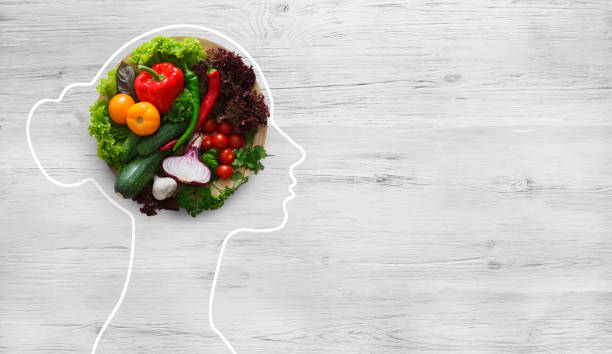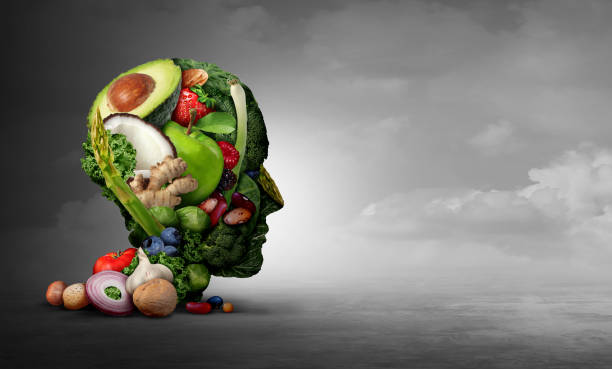Nutrition in Mental Health and physical health have been known to go hand in hand for quite some time. We know that eating right can help us stay at a healthy weight, stave off chronic diseases, and give us more energy. What about the effect that eating has on our psychological health, though? The dynamic area of Future Nutrition in Mental Health steps in to shed light on this intriguing connection between food and mood.
The Gut-Brain Connection: From the Bowel to the Brain

The trillions of bacteria that call our intestines home are known as the gut microbiome, and they’re vital to our physical and emotional well-being. The gut-brain axis is a web of nerves and hormones that these microscopic creatures use to talk to our brains.
The production of neurotransmitters such as serotonin, dopamine, and GABA by a balanced gut microbiome which is rich in beneficial bacteria has a substantial impact on mood, sleep, and stress control. Imbalances in the gut microbiome, which are commonly linked to unhealthy eating habits, can cause inflammation, which in turn interrupts this communication and may play a role in illnesses like depression and anxiety.
Nourishing the Mind: Crucial Elements for Emotional and Nutrition in Mental Health
To operate at their best, our brains which are extraordinarily demanding organs need a steady supply of certain nutrients. Our mental state can be badly affected by deficiencies in particular minerals, vitamins, and fatty acids.
Omega-3 fatty acids, which are abundant in walnuts and oily fish, are essential for normal brain function and may help alleviate depressive symptoms. Similarly, neurotransmitter generation is heavily reliant on B vitamins like folate and B12. Deficiencies in these vitamins can cause cognitive decline, low mood, and exhaustion.
Plant Power: How Fruits and Vegetables May Fight Depression
In addition to being beneficial for your Nutrition in Mental Health, the phytonutrients and antioxidants found in fruits and vegetables can do wonders for your mental health. A reduced risk of depression has been linked to diets high in fruits and vegetables, according to studies.
In addition to bolstering neurotrophic factor synthesis, which helps brain cells grow and repair, these plant-based powerhouses can fight oxidative stress, which harms brain cells.
Eating with Mindfulness for Better Focus
Simply eating can have a profound effect on our mood. As a result of our hectic schedules, we frequently eat without thinking, whether we’re on the go or just watching TV. This has the potential to lower our energy and mood levels as well as cause us to overeat and make unhealthy food choices.
Nutrition in Mental Health as emphasized in Future Nutrition in Mental Health, is a discipline that promotes slowing down, savoring food, and paying attention to signals of fullness and hunger. Eating with awareness has many health benefits, including helping with weight management, mood, and cognitive function.
Customized Plates: Brain-Based Dietary Customisation

It is acknowledged in Future Nutrition in Mental Health that a universally applicable diet plan is not feasible. Our dietary requirements are as individual as our fingerprints. Here is where the idea of customized diet plans becomes useful.
Healthcare providers can develop individualized meal programs by studying aspects such as genetics, gut microbiota makeup, and mental health history. Let your mind wander to a future where a quick blood test can pinpoint imbalances or deficiencies that cause worry or poor mood, and then you may create a unique diet that includes precise nutrients to help your brain stay healthy.
Gut Heroes: Prebiotics and Probiotics for Mental Health
The importance of the gut microbiome on psychological well-being was previously established. Researchers in the field of future nutrition and mental health are looking at how prebiotics and probiotics can benefit both the gut and mental health. In essence, prebiotics are nutrients that the beneficial bacteria in our digestive tract need to thrive.
Supplementing with live bacteria, or probiotics is a great way to bring good bacteria into the stomach. More research is needed to completely understand the influence of prebiotics and probiotics on anxiety and depression symptoms, but preliminary studies show they may be helpful.
Discovering the Link Between Food and Genes Using Nutrigenomics
At the cutting edge of Nutrition in Mental Health and genetics is a new discipline called nutrigenomics, which studies the effects of different diets on people’s unique genetic makeup. There is a lot of hope for the future of nutrition and mental health in this new field of study.
We can optimize brain function and maybe lower the risk of mental health illnesses by creating individualized food regimens based on our knowledge of how our genes interact with particular nutrients. Envision a world where a short genetic test can pinpoint exactly which meals will boost your mood, intelligence, and general mental health.
A New Approach to Treating Mental Illness Through Food

We should expect to see a more integrated and holistic approach to mental health care in the future. Medication and psychotherapy, two examples of more conventional treatments, will remain important. Dietary interventions, however, are presented as a potent supplementary tool in Future Nutrition in Mental Health in Mental Health.
Mental health providers can provide a more all-encompassing treatment plan that promotes both short- and long-term mental health by recommending prebiotics, probiotics, and personalized dietary programs based on nutrigenomics.
Conclusion
An intriguing and dynamic area of study is the relationship between what we eat and our Nutrition in Mental Health. Looking forward, the field of future nutrition in mental health holds great promise for a time when we can use food to fuel not just our bodies but also our minds. The intricate relationships between food and mental health are still a mystery, yet there are certain constants in this field of study.
To improve one’s mental health through food, it is recommended to consume mostly whole, unprocessed foods, to eat a variety of fruits and vegetables, to eat mindfully, and to drink plenty of water. Always keep in mind that your mental health and well-being are directly correlated to the food you eat. By making educated decisions about what you eat, you can take control of your destiny.
